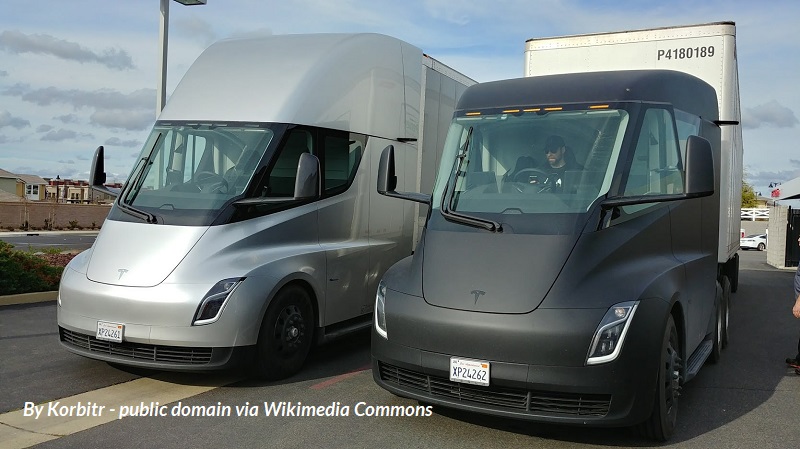Did you know that more than half the vehicles on the road in the United States belong to businesses?
That's a big - and influential - piece of the transportation sector. And its influence is being felt as some corporate leaders are calling for a more sustainable and resilient future through bold commitments to electric vehicles.
As companies electrify their fleets, leverage their buying power, and require the same commitments within their supply chains, they send a strong signal to policymakers and automakers that EVs are the future.
[Pictured below: Two Tesla semi-truck prototypes at a supercharging station in 2018.]
 The Climate Group, EV 100 is a global initiative of companies committed to electrifying vehicle fleets by 2030. Some 89 companies have joined this initiative since its launch in 2017, pledging to integrate electric vehicles into owned/leased corporate vehicle fleets; ensure that service contracts require the use of electric vehicles; and install charging infrastructure at facilities for staff and customers. The Climate Group, EV100 applies to battery electric vehicles, plug-in hybrids/extended range, and hydrogen fuel cell vehicles.
The Climate Group, EV 100 is a global initiative of companies committed to electrifying vehicle fleets by 2030. Some 89 companies have joined this initiative since its launch in 2017, pledging to integrate electric vehicles into owned/leased corporate vehicle fleets; ensure that service contracts require the use of electric vehicles; and install charging infrastructure at facilities for staff and customers. The Climate Group, EV100 applies to battery electric vehicles, plug-in hybrids/extended range, and hydrogen fuel cell vehicles.
In addition to the Climate Group, EV 100, Ceres, a non-profit sustainability organization pairing investors and companies for clean energy solutions, launched a similar organization, Corporate Electric Vehicle Alliance. Initial members include Amazon, AT&T, Clif Bar, Consumers Energy, DHL, Direct Energy, Genentech, Ikea North America, LeasePlan, Lime and Siemens. These companies have some of the largest fleets in the country.
Corporate commitments became a critical influence on our response to climate change as the Trump administration resisted any action to combat it. The commitments show that some leading companies are committed to a clean energy future. A few examples:
- Amazon’s climate pledge includes the purchase of 100,000 Rivian electric delivery vans; 10,000 vans will be in service in 2022 and all 100,000 on the road by 2030.
- Bank of America, based in Charlotte, is offering more than 200 charging points in the United States, United Kingdom and other countries for employees, and installing charging stations at financial centers. Bank of America also offers to reimburse employees $4,000 toward the purchase of an electric vehicle. More than 1,600 employees have taken advantage of this program, which has grown by 40 percent since the company started installing workplace charge points.
- Lyft has committed to reaching 100 percent electric vehicles by its drivers by 2030 and expects to have more than 2 million electric vehicles used on its platform over the next 10 years.
So why are these companies making EVs part of their climate commitments? Reasons include growth of the electric vehicle market and breadth of options; a desire to appeal to customers, especially for retail companies; and cost savings.
The Climate Group, EV 100 initiative expects that the millions of EVs used by its members over the next 10 years will remove approximately 41 million metric tons of CO2 emissions produced by the transportation sector, the equivalent of emissions from 11 coal-fired power plants. (In comparison, Duke Energy has 13 coal plants in operation in North Carolina.)
Electric vehicle sales to individuals are still a small piece of the automobile-sales pie at about 2% to 3% of the market. One of the biggest roadblocks to EV adoption is, believe it or not, automobile dealers. Last year, the Sierra Club surveyed 900 U.S. auto dealerships, finding that less than a quarter sold EVs, and those that did often did little to showcase them. Salespeople were often uninformed on selling points, such as available sales rebates and charging station locations.
In addition, a recent report from the Climate Group, EV 100 highlights the fact that corporate demand for electric vehicles is not being met by automobile manufacturers, surprising given that automakers long claimed that a lack of demand was behind their slow adoption of EV manufacturing. The report mentions that automobile manufacturers will risk losing corporate customers if they don’t speed up manufacturing of electric vehicles.
The future for corporate EV commitments is bright and stands to be even more successful by overcoming barriers such as auto dealers' and makers' resistance, and development of EV charging infrastructure. The N.C. Sierra Club applauds corporations that have committed to electrifying their fleets, and encourages more companies to join this economically and environmentally wise trend.